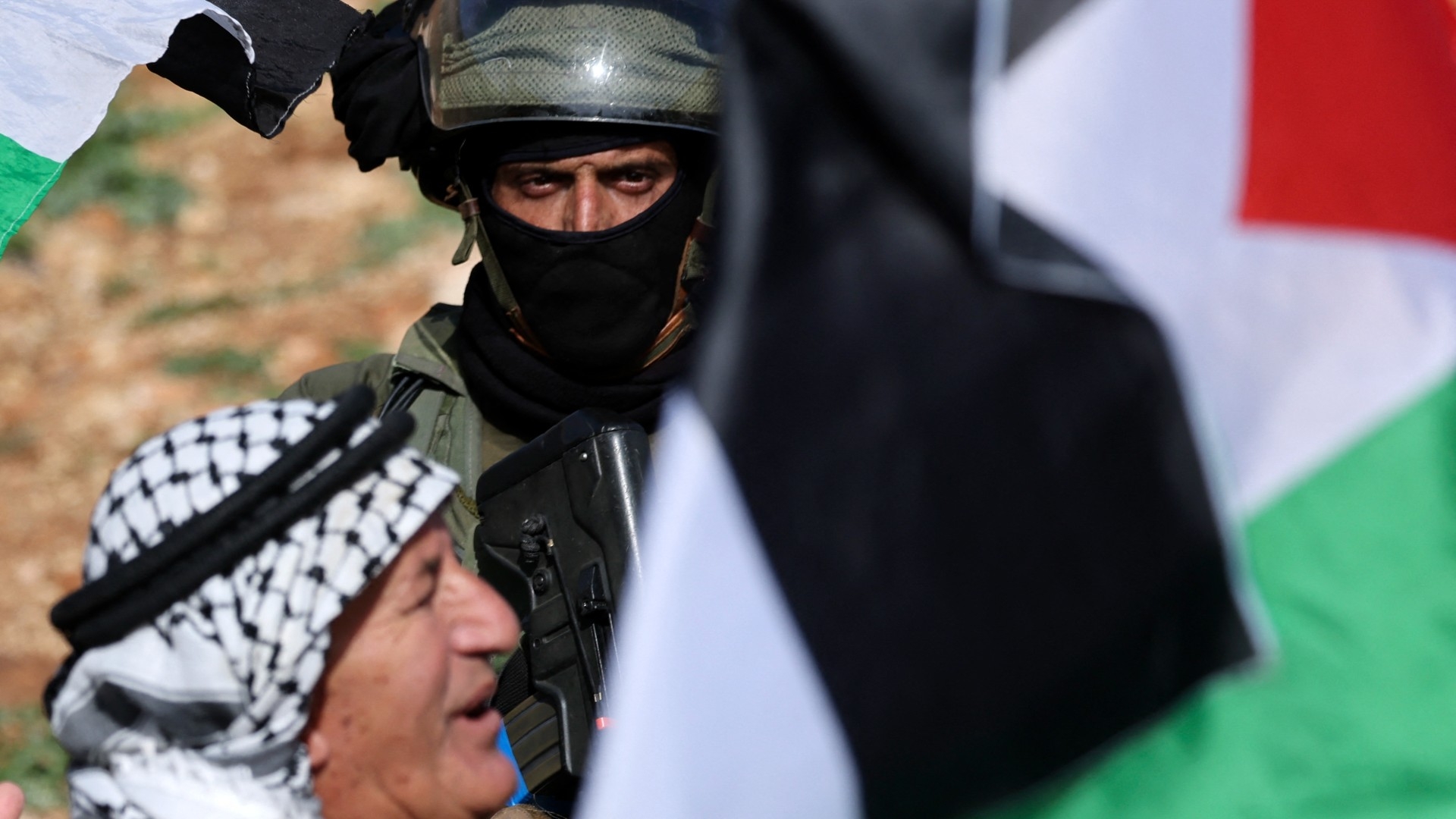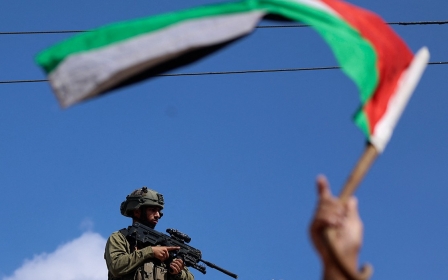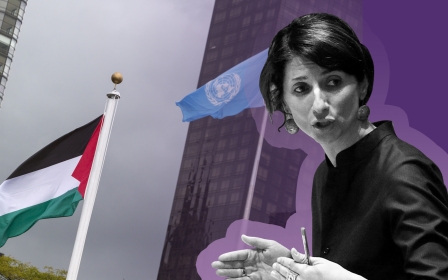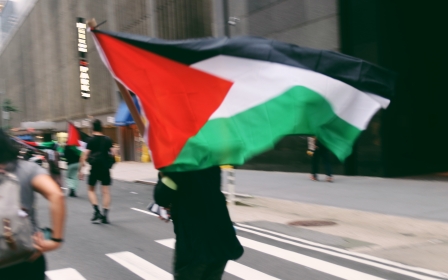Palestine: UN rapporteurs bear witness to injustice of Israeli occupation

From 2001 to 2022, three eminent scholars of international law were charged by the UN with monitoring the situation in the Occupied Palestinian Territories (OPT).
In their new book titled Protecting Human Rights in Occupied Palestine: Working Through the United Nations, authors Richard Falk, John Dugard and Michael Lynk write as both friends and colleagues about their work and experiences as UN investigators.
The reports enable the reader to follow in painful detail the growing fragmentation, dispossession, and control of the indigenous Palestinians
The book, which includes a foreword by the current special rapporteur, Francesca Albanese, is a tremendously valuable resource coming at a time when even the most egregious violations of international law that they documented appear to be outdone by Israel's current far-right, openly racist government.
As the role is both voluntary and unpaid, special rapporteurs are able to function quite freely and dispassionately.
New MEE newsletter: Jerusalem Dispatch
Sign up to get the latest insights and analysis on Israel-Palestine, alongside Turkey Unpacked and other MEE newsletters
John Dugard, a South African human rights lawyer who fought apartheid in his own country for decades, was appointed in 2001. The only special rapporteur to be granted access to the OPTs, he was able to travel unhindered, even during the Second Intifada.
'Worse than apartheid'
Dugard was able to meet with local organisations and people, including the late Palestinian leader Yasser Arafat who was under virtual house arrest at the time.
Dugard came to the conclusion that the situation there was, in fact, far worse than in his native South Africa; many more civilians were killed, more homes destroyed and more constraints on movement, with Palestinians left reliant on the international community, as the occupying power totally abrogated its responsibilities under international law.
Such was the devastating clarity and precision of Dugard's reports that subsequent special rapporteurs were denied access. Falk, who would become his successor, was actually arrested on his arrival and deported.
Lynk, a Canadian lawyer who followed him in 2016, did not even attempt entry. Nevertheless, all three were able to draw on a wealth of evidence collected by legal and human rights organisations, Palestinian, Israeli and international, who were working on the ground, and to talk to Palestinians in neighbouring countries.
Predictably enough, all three lawyers have been subject to intense vilification for their reports - especially Richard Falk, perhaps the most publicly outspoken of the rapporteurs. He writes of his surprise at being appointed to the post by the UN Human Rights Council; he expected that a candidate more "sympathetic" to Israel would be selected.
Israel itself was not a member of the HRC at the time and ironically the US, which would no doubt have vetoed his appointment, had withdrawn in protest against alleged bias against Israel. Falk's unexpected appointment was greeted with insults from the American ambassador to the UN, a flurry of hate mail and death threats, and the usual labels of "self-hating Jew" and "antisemite".
Subsequently Israel's NGO in Geneva, UN Watch, engaged in increasingly vitriolic attacks. In a webinar following the publication of the book, Falk spoke of the widespread "weaponisation" of accusations of antisemitism as a way of "changing the conversation" – discrediting critics in order to stifle any serious debate.
Although banned from entering Israel or the West Bank, Falk was able to organise entry to Gaza from Egypt in 2012, shortly after the Israeli onslaught, Operation Pillar of Defence, and view the devastation for himself. Unfortunately, Sisi's coup in Egypt in 2013 made further access to Gaza impossible.
Harrowing
The reports, which form the main body of the book, enable the reader to follow in painful detail the growing fragmentation, dispossession and control of the indigenous population of Palestine.
Nearly all of Israel's policies of expulsion, settlement, annexation and, ultimately, apartheid, are illegal under international law. On an issue like collective punishment, for example, article 33 of the Fourth Geneva Convention is absolutely clear: "No protected person may be punished for an offence that he or she has not personally committed."
In addressing civil society over the heads of governments, they have created much greater public awareness and inspired activism around the world
But Israel has been repeatedly condemned, even by the Security Council, for actions such as demolishing or sealing thousands of Palestinian homes. The Israelis usually claim that it is the home of an alleged criminal, even if the families or owners have not been charged, let alone convicted, of any crime. Sometimes the family does not even own the house, they may just be tenants.
The most heinous forms of collective punishment have been reserved for the people of Gaza, for more than 16 years. The closure alone by air, sea and land constitutes a form of punishment visited on the entire population. The details of their worsening situation in terms of the repeated onslaughts, loss of basic amenities and infrastructure, and deterioration in physical and mental health make for truly harrowing reading.
The A-word is of course complete anathema to uncritical supporters of Israel. But, as early as 2007, Dugard had talked about an apartheid regime of control used by Israel to maintain its occupation. The applicability of the term to Israel was recently spelt out in unsparing detail by a number of leading human rights organisations.
The rapporteurs believe that this particular crime, such a shameful anachronism in the 21st century, "may well constitute the Achilles heel of Israel's occupation and annexation ambitions".
Limitations of the UN
In the course of the book the personal journeys of the three lawyers also emerge. In the initial stages of their tenures, they assumed that their irrefutable testimony would galvanise the international community. Lynk describes how, perhaps naively, he felt that once he had laid bare the war crime constituted by the building of settlements, the UN would act. He was quickly disabused.
Dugard took up his post at a time when the so-called separation wall ("an act of annexation") was being built, largely on Palestinian territory. He realised the limitations of the UN system when Israel was able to ignore the findings of the International Court of Justice and continue with the construction of the wall with total impunity.
Falk is confident that Palestine will be able to present a very strong case against Israel in the International Court of Justice – if the investigation is allowed to proceed. But time and again the moral weight of international law has succumbed to geopolitical pressures.
There have, of course, been honourable exceptions. Norway, and especially Ireland, have consistently adopted supportive positions in the UN General Assembly and elsewhere, often citing the rapporteurs’ findings.
In the recent public webinar, where the colleagues came together to discuss their work, their frustration with the UN was palpable. They agreed that the organisation is almost "designed to be ineffective".
The veto powers of the five states on the Security Council and America's strategic interest in protecting Israel have succeeded in obstructing the hundreds of resolutions adopted by the General Assembly and the HRC in support of Palestinian rights. In his farewell speech to the UN, Lynk noted "the remarkable unwillingness of the international community to enforce any of its own laws and resolutions."
However, in the concluding chapter, the rapporteurs describe the global impact of their work. They have received positive feedback and invitations to speak from hundreds of NGOs and civil society entities such as churches, universities and trade unions, and have even achieved coverage in the mainstream media.
In addressing civil society over the heads of governments, they have created much greater public awareness and inspired activism around the world. The BDS movement is flourishing, despite all the attempts to outlaw it.
Appointed only last year to the post, Albanese stresses in her foreword the vital importance of the mandate and reaffirms her commitment to continuing in the spirit of her predecessors, "to give justice a chance".
Their work gives us hope that, as with South Africa, pressure can, at last, be brought to bear on governments by an informed public, especially when the starkly neofascist nature of Israel's rule can no longer be ignored.
The views expressed in this article belong to the author and do not necessarily reflect the editorial policy of Middle East Eye.
Middle East Eye delivers independent and unrivalled coverage and analysis of the Middle East, North Africa and beyond. To learn more about republishing this content and the associated fees, please fill out this form. More about MEE can be found here.





